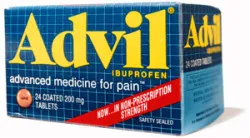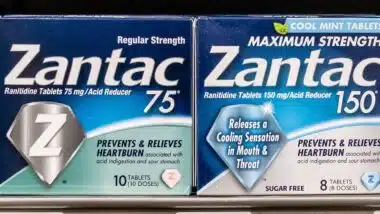 The FDA and medical associations have been working to raise awareness of how ibuprofen-based drugs like Advil carry a risk of users developing Stevens Johnson Syndrome (SJS), especially children under the age of 5.
The FDA and medical associations have been working to raise awareness of how ibuprofen-based drugs like Advil carry a risk of users developing Stevens Johnson Syndrome (SJS), especially children under the age of 5.
In the United Kingdom, 2-year-old Macey Marsh allegedly contracted the painful skin condition SJS after she was given Nurofen, an ibuprofen-based drug similar to Advil. Hours after taking the over-the-counter medication, Macey reportedly developed blisters over her face and eyes, and nearly lost her eyesight, and her life, as the SJS ravaged her skin. She was hospitalized and received medical treatment and monitoring for over a month before she was deemed stable enough to be released. The Marshes are still waiting for specialists to determine if Macey will have permanent eye damage from the SJS allegedly caused by the ibuprofen drug.
In the United States, there have been hundreds of reported SJS medical cases in which young children developed the skin condition after taking NSAID painkiller like Advil (ibuprofen) or Tylenol (acetaminophen), and even reports of toddlers and elders developing SJS after receiving a course of antibiotics like Zithromax. As a result, many families are pursuing SJS lawsuits after a loved one experienced a painful, and often lethal, reaction to these widely used prescription and over-the-counter medications.
Last August, the U.S. Food and Drug Administration (FDA) published a consumer safety announcement discussing the likelihood of contracting SJS when taking NSAID pain killers like Advil. This FDA notice also mandated that all drugs with high rate of reported SJS cases include an SJS warning on their labels.
Additionally, within the last year the Journal of the American Medical Association (JAMA) found that the reported cases of SJS and toxic epidermal necrolysis within the general populace is 1.0 to 7.2 cases per 1 million individuals per year, but “the observed recurrence risk in our study (>7%) is several thousand-fold higher than would be expected.”
While SJS is a rare skin condition, the JAMA study found that those who have contracted SJS once have a higher rate of contracting it again in the future.
What is Stevens Johnson Syndrome?
Stevens Johnson Syndrome (SJS) and a related skin disease known as toxic epidermal necrolysis (TEN) are painful and life threatening medical conditions that present as an allergic reaction to certain classes of prescription and over-the-counter medications. When a patient develops SJS or TEN, the topmost layer of skin cells dies and separates from the deeper, more sensitive layers of skin. When exposed, the delicate mucous membrane becomes blistered and infected without the protection of the topmost epidermal layer.
Because of the intense level of pain and sensitivity experienced by SJS victims, they must be hospitalized for weeks to months at a time. In some extreme cases, a patient may die from SJS.
According to the Stevens Johnson Syndrome Foundation, some symptoms of SJS include:
- Painful blistering of the skin and mucous membrane involvement.
- In many cases preceded with flu like symptoms and high fever.
- As it evolves the skin literally sloughs off.
- Ocular involvement includes severe conjunctivis, iritis, palpebral edema, conjunctival and corneal blisters and erosions, and corneal perforation.
Medications with SJS Side Effects
While any drug could potentially cause SJS and TEN, certain drugs have a higher prevalence of SJS victims. These drugs include:
- Antibiotics
- Anticonvulsants
- Sulfa based drugs
- Bactrim
- Septra
- Acetamenophin
- Amoxicillan
- Azithromycin (Zithromax)
- Barbiturates
- Ibuprofen-Motrin
- Penicillin
- Naproxen
Many individuals and families of individuals who have suffered SJS after allegedly taking Advil ibuprofen and other painkillers are currently pursuing SJS class action lawsuits against drug manufacturers for the pain, permanent damage, and loss experienced by SJS victims.
In general, Stevens Johnson Syndrome lawsuits are filed individually by each plaintiff and are not class actions.
Do YOU have a legal claim? Fill out the form on this page now for a free, immediate, and confidential case evaluation. The attorneys who work with Top Class Actions will contact you if you qualify to let you know if an individual lawsuit or class action lawsuit is best for you. Hurry — statutes of limitations may apply.
ATTORNEY ADVERTISING
Top Class Actions is a Proud Member of the American Bar Association
LEGAL INFORMATION IS NOT LEGAL ADVICE
Top Class Actions Legal Statement
©2008 – 2026 Top Class Actions® LLC
Various Trademarks held by their respective owners
This website is not intended for viewing or usage by European Union citizens.
Get Help – It’s Free
Help for Victims of Stevens Johnson Syndrome
If you or a loved one were diagnosed with Stevens Johnson Syndrome (SJS) or toxic epidermal necrolysis (TEN) after taking a prescribed or over-the-counter medication, you may be eligible to take legal action against the drug’s manufacturer. Filing an SJS lawsuit or class action lawsuit may help you obtain compensation for medical bills, pain and suffering, and other damages. Obtain a free and confidential review of your case by filling out the form below.
An attorney will contact you if you qualify to discuss the details of your potential case at no charge to you.
Oops! We could not locate your form.












